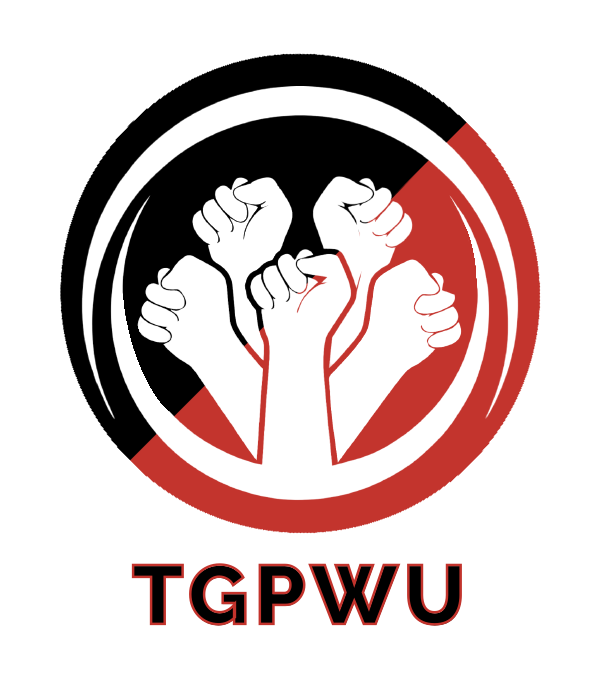TGPWU’s Founder and President Shaik Salauddin, along with other representatives from the Indian Federation of App-based Transport Workers (IFAT) presented a list of gig and platform workers’ grievances and demands to Shri Karti Chidambaram Ji on December 9th in Delhi.
The full text of TGPWU’s submission is below:
TGPWU Position Paper: Major Issues faced by Indian Gig and Platform Workers
TGPWU Position Paper: Major Issues faced by Indian Gig and Platform Workers
The Code on Social Security 2020 must be implemented in all states. The provisions of the Code on Social Security 2020 should be put into effect, particularly as relating to the provision of life and disability cover, accident insurance, health and maternity benefits, old age protection, and importantly, the establishment of the Social Security Fund and the National Social Security Board for gig and platform workers. We also urge the government to implement the recommendations in NITI Aayog’s (2022) report which suggested that gig and platform workers should be provided paid sick leave, health access and insurance, occupational disease and work accident insurance, retirement/pension plans and other contingency benefits, support to workers in a situation of irregularity of work, support for small businesses and entrepreneurs associated with platforms, and contingency cover for workers.
The Motor Vehicle Aggregator Guidelines 2020 should be implemented in all states. ‘Aggregators’ were defined by the The Motor Vehicles (Amendment) Bill, 2019 as digital intermediaries or marketplaces which can be used by passengers to connect with a driver for transportation purposes. The Ministry of Road Transport and Highways subsequently issued the Motor Vehicle Aggregator Guidelines in 2020 to establish a regulatory framework for aggregators, for State Governments to implement, to ensure that the aggregators are accountable and responsible for the operations executed by them. While some states have taken steps to implement the MV Aggregator Guidelines (including Karnataka, West Bengal, Maharashtra and Delhi), most states have implemented no rules to regulate aggregators. Even those states where the ruling party (which issued these Guidelines) is in power, have not implemented them. The government must take steps to ensure that all states make progress in regulating aggregators.
The government should update employment classification rules to legally accord all platform workers with full employment rights. Working conditions on digital platforms are largely regulated solely by the terms of service agreements that platform companies unilaterally determine, and that workers have to agree to before they can begin work, usually by checking a box on the app screen. These contracts tend to characterise the relationship between the platform owner and worker as other than one of employment—defining platform workers as independent contractors, partners, self-employed or equivalent, as against employees. The distinction between an ‘employee’ and ‘contractor’ rests on the degree of control that the contracting party (the platform) exercises over the contracted party’s (the worker’s) earnings and working conditions. Digital platforms exhibit anticompetitive, monopsonistic tendencies, wherein they make workers economically dependent on them through price-fixing and by exerting control over the manner of service provision (i.e. meeting the definitional criteria of an ‘employer’). Therefore, we urge the Government to:
- firstly, to clarify and streamline employment classifications to legally accord all platform workers with full employment rights, excepting of genuinely self-employed workers. These include minimum wage guarantees, paid sick leave, maternity leave and employee provident fund arrangements.
- secondly, to switch the presumption so that the party engaging workers (i.e. the platform) needs to first prove that the worker is a contractor, rather than the worker having to prove that they are an employee.
- thirdly, to proactively intervene to penalise and put a stop to persisting sham contracting practices in the platform economy.
Digital platforms must be required to provide a Net Minimum / Living Wage Guarantee for all working hours. After factoring in fuel and other work-related costs (which gig and platform workers have to bear themselves), many gig and platform workers’ take-home earnings per hour worked fall below the minimum wage level. We urge the government to require that platform companies ensure that every gig and platform worker earns above minimum or living wages for all the hours that workers are logged in and available to work (i.e. ‘working hours’), after factoring in work-related costs.
Digital platforms must be required to mitigate workers’ occupational health and safety risks. Gig and platform workers in the app-based taxi and delivery sectors face various occupational health and safety risks, including accidents and injuries, road safety, possibility of theft and physical assault, discrimination or harassment. These risks are often worse for women and minorities. The Code on Occupational Health, Safety and Working Conditions, 2020 should also be extended to platform workers. Platform aggregators should be held accountable for the safety of platform workers in their working hours (i.e. while they are logged into the platform and available to work) including in the case of harassment, accidents, and assault. Platform companies should also be required to provide adequate equipment and training to protect workers’ occupational health and safety at no additional cost to workers, and to implement policies and practices to ensure that workers do not suffer significant costs as a result of work-related accident, injury or disease.
Data Rights must be guaranteed for gig and platform workers. The recent draft of the Digital Personal Data Protection Bill, 2022 does not contain provisions that explicitly protect gig and platform workers. At present it is unclear what data rights this contingent of workers have. The Government should guarantee platform workers rights over the data they generate, including rights of access, data portability, and right to explanation. Platforms must be required to be transparent about their algorithms, and be required to subject to periodic public audits. Incentive structures should be delinked from pay so that workers can have a minimum guaranteed pay for hours worked that is not dependent on manipulable rankings.
Fuel must be brought under the ambit of the Goods and Services Tax (GST). Platform workers, particularly in the transportation and delivery sectors, have been severely impacted by growing fuel prices in recent years. Major platforms’ incentives and rate cards have not kept pace with fuel prices, cutting deeply into workers’ net earnings. We urge the government to bring fuel under the GST’s ambit, as this will substantially reduce fuel prices and help workers.
The revised penalties under the Motor Vehicles (Amendment) Act 2019 must be reversed. In the Amendment, the penalties for general offences faced by drivers have increased from Rs.50-300 to Rs.500-1,000. This level of penalty is prohibitive to app-based transport workers, and we urge the government to reverse the penalties to the original amounts.
The Government should clarify which Ministry is responsible for gig and platform workers’ welfare. At present, multiple ministries (the Ministry of Labour and Employment, the Ministry of Electronics and Information Technology, and the Ministry of Road Transport and Highways) have sought to issue rules and guidelines regarding gig and platform workers, but it is not clear to which authority workers should address with grievances. The Government should either provide clarification on the same, or create a new Ministry or Department with sole responsibility for hearing and addressing workers’ concerns.
Tripartite social dialogue must be introduced in the platform economy. Presently, digital platforms are not negotiating with labour unions that represent platform workers on any matters relating to rate cards (wages), working conditions, and disputes. Effective social dialogue between government, platforms and workers’ organisations, and sound industrial relations, is necessary for improving wages and working conditions for gig and platform workers, and in promoting sustainable enterprises in the platform economy. We urge the government to take steps to introduce a tripartite system with labour unions, digital platforms, and the government to consultatively reckon with issues arising vis-à-vis the platform economy and the changing landscape of the world of work.
The government should invest in and incubate alternative platforms and platform cooperatives. Allowing a handful of private monopolistic and oligopolistic companies to dominate the platform economy is inimical to the fostering of sustainable enterprises and social justice. The government should invest in developing state-owned and operated aggregator platforms and mobile apps for auto/taxi services, which could be integrated with existing public transport systems. This is already being pursued in some states like Kerala and Rajasthan. The same strategy should be pursued in the delivery, home services and other platform economy sectors too. Additionally, the government should invest in, incubate and subsidise platform cooperatives where workers and worker representatives are part-owners of the enterprise.
See the original letter submitted to Shri Karti Chidambaram Ji here.
Note: This position paper was prepared with support from TGPWU volunteer and researcher Srujana Katta.

